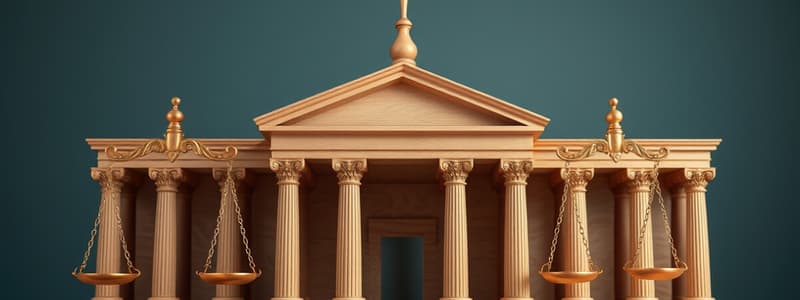Podcast
Questions and Answers
Which legal system is primarily based on judicial decisions and precedents?
Which legal system is primarily based on judicial decisions and precedents?
- Customary Law
- Religious Law
- Civil Law
- Common Law (correct)
In a Civil Law system, judges play a critical role in legislation.
In a Civil Law system, judges play a critical role in legislation.
False (B)
What principle ensures that all individuals and institutions are accountable to the law?
What principle ensures that all individuals and institutions are accountable to the law?
Rule of Law
The ______ branch of government interprets laws and resolves disputes.
The ______ branch of government interprets laws and resolves disputes.
Match the following legal concepts with their definitions:
Match the following legal concepts with their definitions:
Which of the following is a source of law that involves laws enacted by parliament?
Which of the following is a source of law that involves laws enacted by parliament?
Customary Law is based on written statutes and laws.
Customary Law is based on written statutes and laws.
What type of liability involves disputes between individuals or organizations typically resolved through compensation?
What type of liability involves disputes between individuals or organizations typically resolved through compensation?
Flashcards are hidden until you start studying
Study Notes
Legal Systems
-
Definition: The framework of rules and institutions that govern society, ensuring order and justice.
-
Types of Legal Systems:
- Common Law: Based on judicial decisions and precedents rather than statutes.
- Civil Law: Based on codified laws and statutes; judges play a less critical role in legislation.
- Customary Law: Based on traditions and community practices; often unwritten.
- Religious Law: Derived from religious texts and teachings; governs personal and family matters.
-
Structure of Legal Systems:
- Court Hierarchy:
- Higher Courts (Supreme Court, Appeals Court) handle serious cases and appeals.
- Lower Courts (Magistrates’ Courts, Local Courts) deal with minor offenses and preliminary hearings.
- Legislative Branch: Creates laws through parliament or legislative bodies.
- Executive Branch: Enforces laws, often through various government agencies.
- Judicial Branch: Interprets laws, resolves disputes, and administers justice.
- Court Hierarchy:
-
Sources of Law:
- Statutes: Laws enacted by parliament.
- Common Law: Law developed through court decisions.
- Constitutional Law: Fundamental principles that govern a state.
- International Law: Rules and agreements between sovereign states.
Basic Legal Concepts
-
Justice: The principle of fairness and moral rightness in the legal system.
-
Rule of Law: The idea that all individuals and institutions are accountable to the law that is fairly applied and enforced.
-
Legal Rights and Responsibilities:
- Rights: Entitlements granted by law (e.g., right to a fair trial, freedom of speech).
- Responsibilities: Obligations that individuals must fulfill according to law (e.g., obey laws, pay taxes).
-
Liability: Legal responsibility for one’s actions or omissions; may be civil or criminal.
- Civil Liability: Involves disputes between individuals or organizations, typically resolved through compensation.
- Criminal Liability: Involves actions that violate laws and are punishable by the state.
-
Legal Capacity: The ability of an individual to enter into legal agreements and be held accountable for their actions.
-
Judicial Precedent: The practice of using previous court decisions to guide the resolution of current cases.
-
Legislation: Laws created by the legislative body, which can be amended or repealed.
-
Alternative Dispute Resolution (ADR): Methods for resolving disputes outside the court system, such as mediation and arbitration.
Legal Systems
- Framework governing society, ensuring order and justice.
- Types of Legal Systems:
- Common Law: Relies on judicial decisions and legal precedents rather than written statutes.
- Civil Law: Predicated on codified laws; judges have a limited role in law-making.
- Customary Law: Based on long-standing community traditions; typically unwritten.
- Religious Law: Governs personal and family matters according to religious texts and teachings.
Structure of Legal Systems
- Court Hierarchy:
- Higher Courts (e.g., Supreme Court, Appeals Court): Address serious cases and handle appeals.
- Lower Courts (e.g., Magistrates’ Courts, Local Courts): Manage minor offenses and preliminary hearings.
- Legislative Branch: Responsible for creating laws; operates through parliamentary systems.
- Executive Branch: Enforces laws via various governmental agencies.
- Judicial Branch: Interprets laws, resolves disputes, and dispenses justice.
Sources of Law
- Statutes: Laws enacted by legislative bodies.
- Common Law: Evolving legal standards derived from judicial rulings.
- Constitutional Law: Core principles establishing the governance of a state.
- International Law: Codified rules and treaties governing relations between sovereign states.
Basic Legal Concepts
- Justice: The embodiment of fairness and moral righteousness within the legal framework.
- Rule of Law: Principle that all individuals and entities are subject to and accountable under the law, fairly applied.
- Legal Rights and Responsibilities:
- Rights: Legal entitlements, including the right to a fair trial and freedom of speech.
- Responsibilities: Legal obligations, such as obeying laws and fulfilling tax duties.
- Liability: Legal accountability for actions or inactions, categorized into civil or criminal.
- Civil Liability: Arises from disputes between private parties; often resolved through financial compensation.
- Criminal Liability: Involves breaches of law subject to state prosecution.
- Legal Capacity: Refers to an individual’s ability to engage in legal agreements and to be held accountable.
- Judicial Precedent: The practice of adhering to previous court rulings to guide judicial decisions in new cases.
- Legislation: Laws enacted by the legislative branch, subject to change or repeal.
- Alternative Dispute Resolution (ADR): Non-court methods for resolving conflicts, such as mediation and arbitration.
Studying That Suits You
Use AI to generate personalized quizzes and flashcards to suit your learning preferences.




